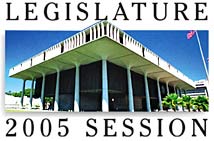Educators say Lingle
budget falls short
Legislators are told the $82.1 million
gap may put compliance at risk
Key public school programs are underfunded by millions of dollars under the Lingle administration's proposed education budget, education officials told lawmakers yesterday in laying out their case for more funding.
In a briefing to members of the House Education Committee, Schools Superintendent Patricia Hamamoto said Gov. Linda Lingle's proposed 2005-07 budget is $82.1 million short of the department's needs.
|
|
The proposed biennial executive budget is $18.7 million short for special education and $10.6 million shy on funding for autistic children, she said.
"We could end up in Felix II," Hamamoto warned lawmakers.
The Legislature's own budget is taking shape this week, and yesterday's briefing was called by Education Chairman Roy Takumi to assess the Department of Education's needs more closely. The department says it also will need $18 million more than Lingle has proposed for its school lunch program for the next two years, and $16.3 million for student transportation.
Complying with the 2004 Reinventing Education Act, or Act 51, will require $10.6 million more for converting school principals to 12-month contracts from the current 10 months, and $4.1 million for technology upgrades.
"I think we're looking at an underfunded Act 51," said Takumi (D, Pearl City-Pacific Palisades), referring to the executive budget.
The bill, which mandates greater accountability at the school level, was passed by the Democratic-controlled Legislature last year over Lingle's veto.
In defending Lingle's budget, her budget director, Georgina Kawamura, said yesterday that Act 51 contains no funding requirement.
"Education is just one of 21 departments in the government, and we had to make some very, very hard decisions with the amount of money available to us," she said.
However, Takumi said the Department of Education has made "a good case" for its funding needs and that he will push for more money.
"If the Legislature doesn't go along with any of the tax cuts that have been proposed, I'm confident we can fully fund the department," he said.
Takumi said the school transportation issue was among the most worrying, noting that the department's program is typically underfunded by $1 million to $2 million a year.
"We can't teach the kids if we don't get them to school," he said.
School officials said the burden of supplying its bus services, which are contracted out to private providers, is growing with rising costs and a small pool of providers driving hard bargains for their services.
"We feel like we're being held hostage by some of our providers," Hamamoto said.
[News] [Business] [Features] [Sports] [Editorial] [Do It Electric!]
[Classified Ads] [Search] [Subscribe] [Info] [Letter to Editor]
[Feedback]

